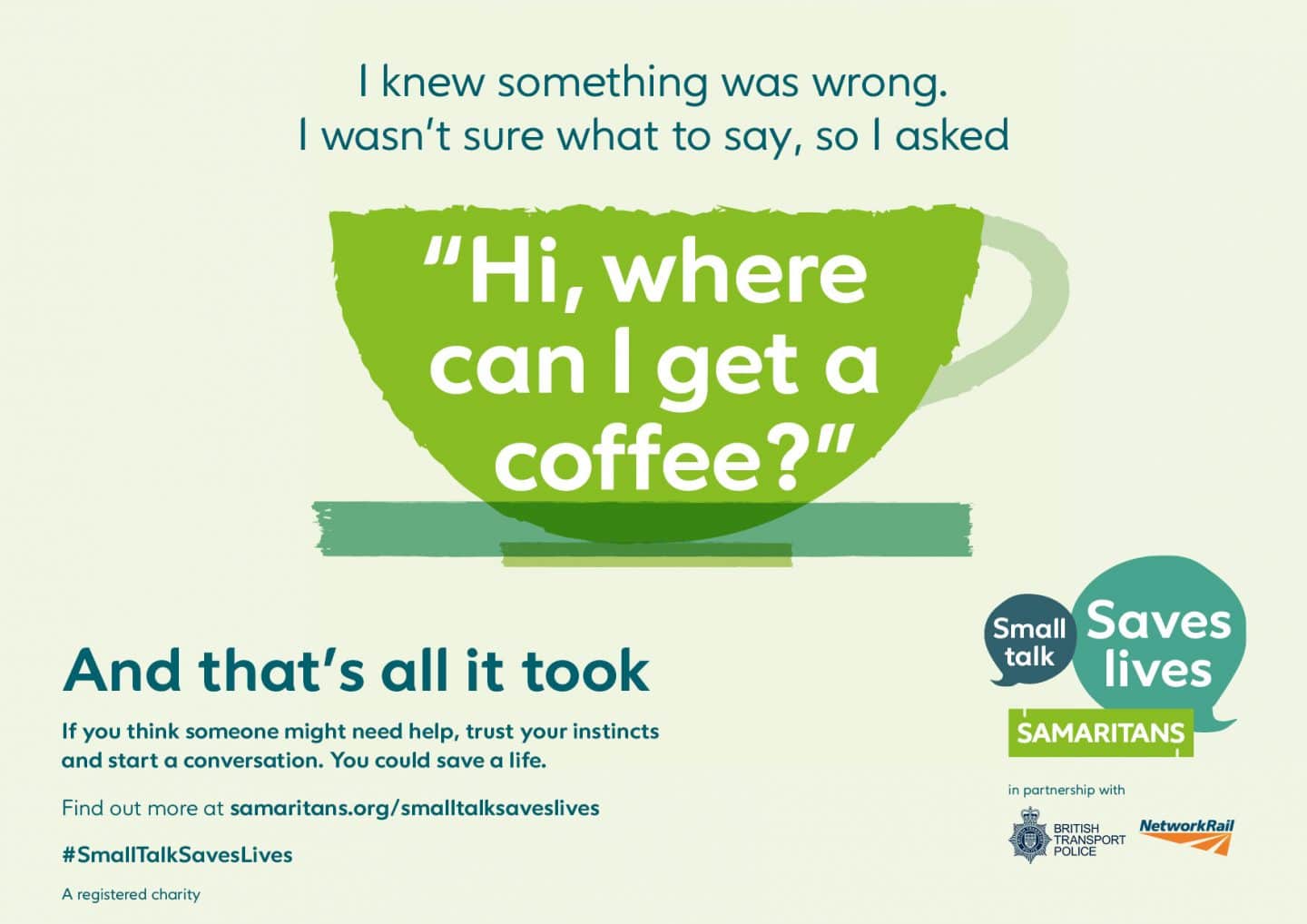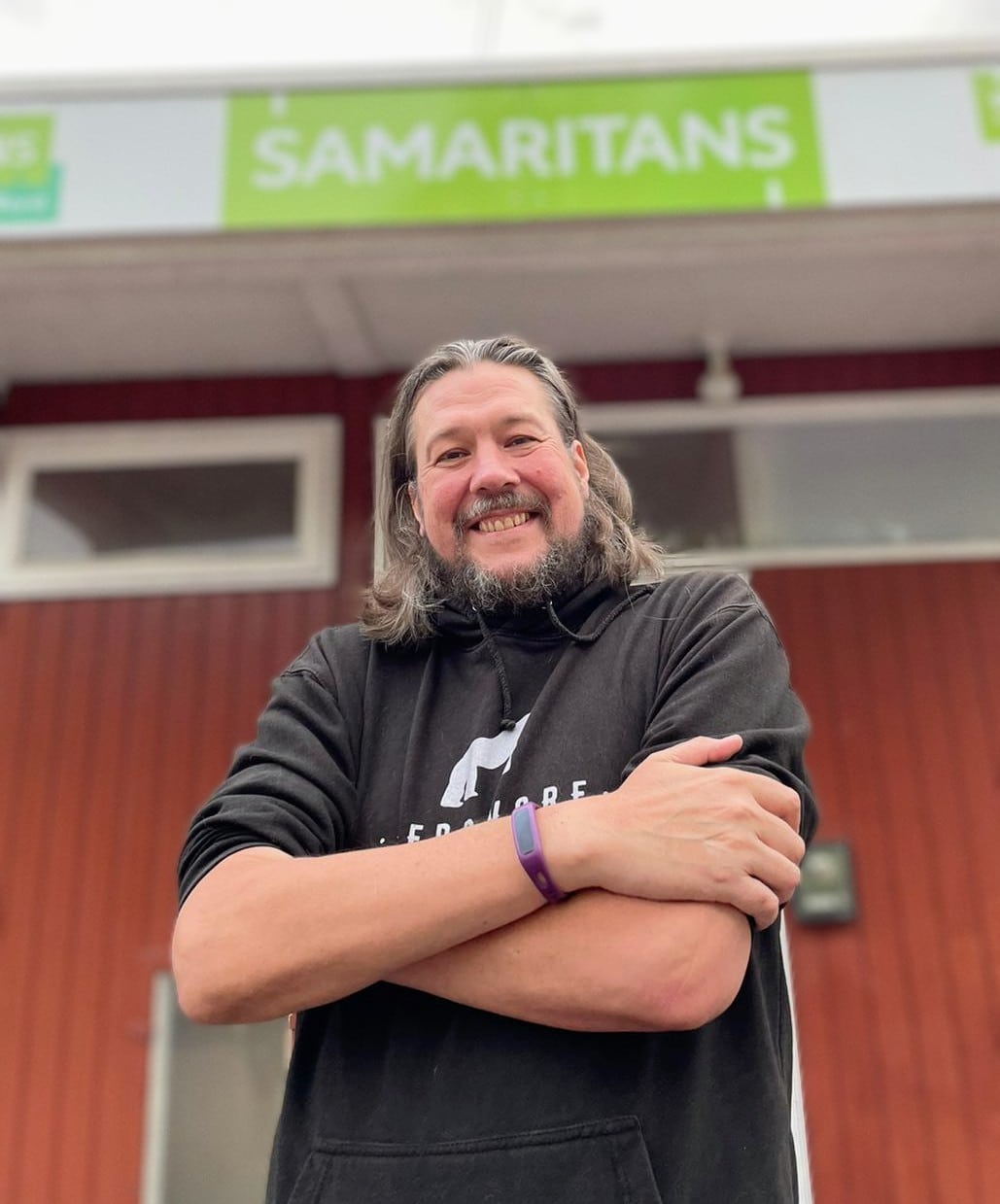Small Talk Saves Lives
Mental Health
Samaritans’ Small Talk Saves Lives campaign, in partnership with Network Rail & British Transport Police, is running throughout August aiming to encourage the public to help prevent suicide in public settings. Here, Damon Preece, a Samaritans volunteer, describes how small talk allowed him to a stranger who needed help...
As the nation begins to readjust to life with easing restrictions, Samaritans’ Small Talk Saves Lives campaign in partnership with Network Rail and British Transport Police has relaunched this month to encourage the public to act to prevent suicide on the railways and in other public settings.
After an incredibly tough year, the awareness campaign reminds the public they already have the skills to start a conversation with someone who needs help, giving them the confidence to act. By trusting our instincts, if something doesn’t feel right, a little small talk and a simple question, such as “Hello, what’s the time?” can be all it takes to interrupt someone’s suicidal thoughts and help start them on the journey to recovery. It could save a life.
The latest phase of Small Talk Saves Lives comes as a new survey by Samaritans shows how much we rely on small talk as a nation, even with the limiting social restrictions of the pandemic. A YouGov survey found that over three quarters of UK adults (78%) used small talk during the pandemic, whilst almost one in five of those surveyed say they are more likely to want to make small talk with a stranger face to face once restrictions are lifted (19%). The survey also highlighted the benefits small talk can have, with over half of respondents saying it can make people feel less lonely (57%) and boost their own mental health and wellbeing (45%), as well as showing others that people care and want to help them (28%).*

Samaritans’ volunteer Damon, aged 48, knows the importance of small talk, as he made an intervention helping a man at a train station when he was out in the community talking about the work of Samaritans. Damon has been a dedicated Samaritans’ volunteer at Stafford branch since 2017, inspired to help others after he was bereaved by suicide.
Damon said: “I don’t think there’s many parts of the Samaritans’ branch that I haven’t been part of – it’s a privilege. I’m heavily involved in our outreach work – we go to all areas of the community to let them know they can come and talk to us. I also run the rail programme that we do in branch and there was a time last Summer when I was able to help someone who was absolutely at the end of their tether.
I noticed him as he wandered in off the platform and onto the concourse – he looked distant and was almost wandering around like a little lost child. I might be a big bloke, but I’ve got a soft heart and I just wanted to run over and hug him and say “whatever you’re going through, let’s help you out.” I went over to him and just said, “alright chap, how are you? Are you doing okay?” and I was just trying to break him out of his daze to get him talking to me.
The conversation progressed, and he told me he’d recently lost his long-term partner and riding the railway was something they used to do together. He was getting more and more teary as he was talking things through and said he’d not been able to get the support he needed – you could just tell he’d been building up to take his life. I spent about 15 minutes with him until I got him to a point where I felt safe to let him leave and I gave him a Samaritans’ contact card. He went away smiling and it was a moment that I’ll never forget.
My personal experience has made me more likely to help someone in that situation, but everyone has the ability to talk and look out for others. I lost my cousin who was a farmer to suicide and it’s one of the reasons I joined Samaritans. Seeing somebody so isolated out on the fields of a farm, it’s very easy to fall through the cracks of life, and the support wasn’t there for him. It was one of those things that pushed me on to try and find the tools I needed to notice and be there for such people. I think I’m a naturally compassionate person anyway and I’ve always been the kind of person to step in if I could. To anyone who needs encouragement – I’d say try and forget that you’re a little bit nervous; try and forget that they might not be open to the contact and still keep trying because if it’s the one person in your whole life that you reach out to, then that’s made a world of difference to one person.
I can understand as we come out of the pandemic and restrictions ease why some people might be nervous to talk to people and build those small talk skills again. A few years ago, after a lot of pain in my back and shoulders, a few operations, my spine actually collapsed and I spent a lot of time at home, lying on the sofa on medication and couldn’t work anymore. It got to the point where I became housebound and almost agoraphobic. When my spine had healed, I knew I had to get back out into the world and that was another reason I got involved with Samaritans. We have to push ourselves forward and keep trying to get that communication skillset back – talking is so important.”
Samaritans CEO Julie Bentley said: “We know that the pandemic has had a huge impact on the nation’s mental health and wellbeing and even though restrictions are lifting, people are still struggling. It’s so important we look out for one another now more than ever, because suicide is preventable and it’s everybody’s business.
How people act when they are struggling to cope is different for everyone – people may seem distant or upset, but suicidal thoughts are often temporary – so if something doesn’t feel right, trust your instincts and try and start a conversation. Whether that’s on a journey home from work as we start to travel more or someone you may pass in the street – any one of us could have an opportunity to save a life. Let’s start a conversation and work together to prevent suicide.
If people don’t feel comfortable themselves, they are encouraged to alert a member of staff or call 999 in an emergency.”
Find out more about Samaritans’ Small Talk Saves Lives, in partnership with Network Rail and British Transport Police at: www.samaritans.org/smalltalksaveslives or join the conversation on social media using #SmallTalkSavesLives.
Anyone can contact Samaritans for free any time from any phone on 116 123, even a mobile without credit, and the number won’t show up on your phone bill, email jo@samaritans.org or go to www.samaritans.org
* Survey was carried out by YouGov from 2-4 July 2021 with a total sample size of 2224 adults. unless otherwise stated, are from YouGov Plc. The survey was carried out online. The figures have been weighted and are representative of all UK adults (aged 18+).
Trending

Join The Book of Man
Sign up to our daily newsletters to join the frontline of the revolution in masculinity.

















